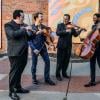
Good things can happen for those who wait.
The Los Angeles Philharmonic and its Creative Chair for Jazz Herbie Hancock had planned an all-star celebratory concert for Herbie’s longtime friend, colleague, and fellow Buddhist Wayne Shorter. Also on the bill was a set led by the estimable trumpeter/composer Ambrose Akinmusire. The whole thing was supposed to take place April 5, 2020.
Note the date. That turned out to be on COVID time — and so, there was not a note to be heard that day. But there can be second chances in life and music. In a miracle of fortuitous timing, all of the performers who were originally scheduled to appear in 2020 were available to try again at Walt Disney Concert Hall Wednesday night (March 9). This time, operating under Disney Hall’s strict vaccination and masking requirements (still in place here despite L.A. County’s relaxation of pandemic regulations days before), the concert came off — splendidly, and not without a few surprises.

First up was a performance of Akinmusire’s boundary-stretching, hour-long composition Origami Harvest, which was released in a studio recording in 2018 (Blue Note). Going beyond the old third-stream idea, Akinmusire tries to create a fourth stream here, juxtaposing and combining a small, post-bop jazz combo, a rapper, and a classical string quartet into one unit while simultaneously making a statement about the divides in society and politics.
From the evidence of this live performance, the piece has evolved: It coalesces more convincingly now than it did on the recording. The slow crescendo of string rustlings and pensive Akinmusire trumpet set the thoughtful mood from the outset, and it continued even when the musicians ventured to the outside. The writing for the Mivos Quartet can be lyrical or spiked with edgy harmonies, and in certain sections, the foursome could mix it up pretty good with Sam Harris’s sometimes thunderous piano and Justin Brown’s often subtle complexities on the drums. Vocalist Kokayi showed a much greater expressive range than his studio predecessor, combining rap with sung passages.

As before, Akinmusire didn’t play much trumpet here, spending a good deal of time tracing high-pitched melodic lines on a small keyboard, but what did come out of his horn was eloquent testimony to the idea of less-is-more. It was a most absorbing set, leaving out the album version’s rundown of the names of Black victims of police and vigilante killings, and ending with a freewheeling flourish.
For the Wayne Shorter Celebration, Hancock introduced a group that is about as distinguished a jazz sextet as can be assembled in 2022 — Terence Blanchard on trumpet, Joe Lovano on tenor sax, Kenny Garrett on alto sax, and members of Shorter’s two-decades-long quartet, pianist Danilo Perez, bassist John Patitucci, and drummer Brian Blade. All are leaders, all are masters of improvisation in their 50s and 60s, and all have transcended jazz to embrace other forms of music at one time or another.

But first, there was an unadvertised bonus, for Hancock himself sat in with Blanchard, Patitucci and Blade on “Footprints,” playing with sensitive erudition on his customary Fazioli piano that was wheeled off the stage after just this one number. Then Hancock ventured into the audience to introduce Shorter, now wheelchair bound, who repeated a story that he told the Broad Stage audience last month after the local premiere of his new opera ... (Iphigenia). He talked about playing inventive games with his friends as a child and when asked by parents what they were doing, they replied, “Nothing.” Parables like this have been told by others previously, but a point was made — letting nothing impede the imagination. That’s how Wayne has led his life in music and in conversation, which can shoot in amazingly unpredictable directions.
With that, Hancock left the stage to the sextet (with Perez now playing a Yamaha grand) which launched into a series of unidentified Shorter compositions, the front line of horns harmonizing beautifully on their long-limbed melodies. Each of the horn players got a solo number to muse on with the piano trio — Blanchard requoting from “Footprints” in his, Lovano doing a slow, soulful ballad, Garrett dramatically building his ballad toward a stormy central section.
Driven by Blade’s mastery of nuance and sudden explosions of percussive sound, the moods and colors shifted intuitively among the six as they explored anew the territory between post-bop and freebop. Shorter played a crucial part during the 1960s in shaping this stream of jazz language, which had to wait until the 1980s to exert its full influence upon the musicians in this band, not to mention countless others. And on this night, even though he no longer performs for health reasons, Shorter at 88 could witness his influence in full, mature bloom.






